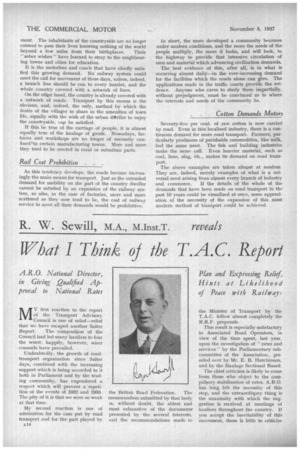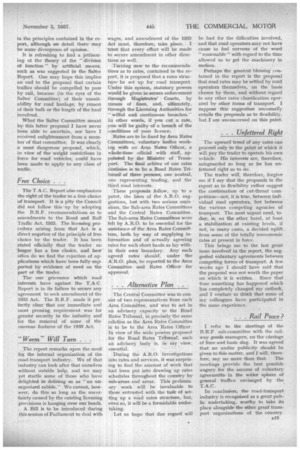R. W. Sewill, m.A., M.Inst.T. reveals
Page 22

Page 23

If you've noticed an error in this article please click here to report it so we can fix it.
Vivi I Think of the T.A.C. _Report
MY first reaction to the report of the Transport Advisory Council is one of relief—relief that we have escaped another Salter
Report. The composition of the Council had led many hauliers to fear the worst; happily, however, wiser counsels have prevailed.
Undoubtedly, the growth of roadtransport organization since Salter days, combined with the increasing support which is being accorded to it both in Parliament and by the trading community, has engendered a respect which will prevent a repetition at the events of 1932 and 1933. The pity of it is that we were so weak at that time.
My second reaction is one of admiration for the case put by road transport and for the part played by E 1 4 the British Road Federation. The memorandum submitted by that body is, without doubt, the ablest and most exhaustive of the documents presented by the several interests, and the recommendations made to the Minister of Transport by the T.A.C. follow almost completely the B.R.F. proposals.
This result is especially satisfactory to Associated Road Operators, in view of the time spent, last year, upon the investigation of "rates and services" by the Parliamentary subcommittee of the Association, presided over by Mr. E. B. Hutchinson, and by the Haulage Sectional Board.
The chief criticism is likely to come from those who object to the compulsory stabilization of rates. A.R.O. has long felt the necessity of this step, and the extraordinary thing is the unanimity with which the suggestion is received at meetings of hauliers throughout the country. If you accept the inevitability of this movement, there is little to criticize
in the principles contained in the report, although on detail there may be some divergence of opinion.
It is refreshing to find a jettisoning ot the theory of the "division of function by artificial means, such as was suggested in the Salter Report. One may hope this implies an end to the proposal that certain traffics should be compelled to pass by rail, because (in the eyes of the Salter Committee) of their unsuitability for road haulage, by reason of their bulk or the length of the haul' involved.
What the Salter Committee meant by this latter proposal I have never been able to ascertain, nor have received enlightenment from a member of that committee. It was dearly a most dangerous proposal, which, in view of the weight restrictions in force for road vehicles, could have been made to apply to. any class of traffic.
Free Choice .
The T.A.C. Report also emphasizes the right of the trader to a free choice of transport. It is a pity the Council did not follow this -up by adopting the B.R.F. recommendations as to amendments to the Road and Rail Traffic Act, 1933. The licensing. procedure arising from that Act is a direct negation of the principle of free choice by the trader. It has been stated officially that the trader no longer has a free choice, and hoWoften do we find the rejection of applications-which have been fully supported by evidence of need on the part of the trader.
The one grievance which road interests have against the T.A.C. Report is in its failure to secure any agreement to seek amendment of the 1933 Act. The B.R.F. made it perfectly clear that our immediate and most pressing. requirement was for greater security in the industry and for the removal of some of the onerous features of the 1933 Act,
"Worm." Will Turn. .
The report remarks upon the need for the internal organization of the road-transport industry. We of that industry can look after that ourselves without outside help, and we may yet startle some of those who have delighted in defining us as "an. unorganized rabble." We cannot, however, do this so long as the uncertainty caused by the existing licensing Provisions is hanging over our heads.
A Bill is to be introduced during this session of Parliament to deal with wages, and amendment of the 1933 Act must, therefore, take place. I trust that every effort will be made to secure amendment in other directions as well.
Turning now to the recommendations as to rates, contained in the report, it is proposed that a rates structure be set up for road transport. Under this system, statutory powers would be given to secure enforcement through Magistrates Courts, by means of fines, and, ultimately, through the Licensing Authorities for " wilful and continuous. breaches." In other words, if you cut a rate, you will be guilty of a breach of the conditions of your licence.
Rates are to be fixed by Area Rates Committees, voluntary bodies working with an Area Rates Officer, a whole-time official with staff, appointed by the Minister of Transport The final arbiter of our rates destinies is to be a Road Rates Tribunal' of three persons; one neutral, one representing trading, and the third road interests.
These proposals follow, up to a point, the lines of the A.R.O. suggestions, but with two serious omissions, the Sub-area Rates Committees and the Central Rates Committee. The Sub-area Rates Committees were felt by A.R.O. to be essential for the assistance of the' Area Rates Committees, both by way of supplying information and of actually agreeing rates for such short hauls as lay within their own boundary. Any. such agreed rates should, under the A.R.0: plan, be reported. to the Area Committee and Rates Officer for approval.
. Alternative Plan
The Central Committee was to consist of two representatives from each Area Committee, and Was to act in an advisory . capacity to: the Road Rates Tribunal, in precisely-the same relation as the Area Rates Committee is to be to the Area Rates Officer. In view of the wide powers proposed for the Road Rates Tribtinal, such an advisory body is, in: my view,
essential. .• '
buring th A.R.O. investigations into rates and services, it was surprising to find the amount of work that had been put into drawing up rates schedules throughout the country by sub-areas: and areas. This preliminary work will he invaluable -to those entrusted with the task of set= ting up a road rates structure, but, even so, it will be a formidable. undertaking.
Let us hope that due regard will be had for the difficulties involved, and that road operators may not have cause to feel nervous of the word "
reasonable" with regard to the time allowed us to get the machinery in motion.
Perhaps the greatest blessing contained in the report is the proposal that road rates may be settled by road operators themselves, on the basis chosen by them, and without regard to any other rates classification operated by other forms of transport,. I suppose this suggestion necessarily entails the proposals as to flexibility, but I am unconcerned on this point.
. • . Unfettered Right
The upward trend of any rates can proceed only to the point at which it will pay the trader to operate his own vehicle. His interests are, therefore, safeguarded so long as he has unfettered right so to do.
The trader will, therefore, forgive me if I say that the proposals iii the report as to flexibility rather suggest the continuation of cut-throat corn. petition—not', it is true, between individual road operators, hut between the various competing agencies of transport. The most urgent need, today, is, on the other hand, at least a stabilization at existing levels, if not, in many cases, a decided uplift, from some of the totally uneconomic rates at present in force.
This brings me to the last great issue involved in the report, the suggested voluntary agreements between competing forms of transport. A few weeks ago I should have said that the proposal was not worth the paper on which it is written. Since that time something has happened which has completely changed my outlook, and I venture to think that some of my colleagues have participated in the same experience.
• . Rail Peace?
I refer to the rheetings of the B.R:F. sub-committee with the railway pods managers; on the carriage of lime. and basic slag. It was agreed, that no undue publicity should be given to' this matter, and' I will, therefore, say no more than that. The meetings provide the best possible augury for the success of voluntary agreements in the wider sphere of general traffics envisaged by the T. A ,C..
In conclusion, the road-transport industry' is recognized as a great public nndertaking, worthy to take its place alongside the other great transport organizations of the country.


















































































